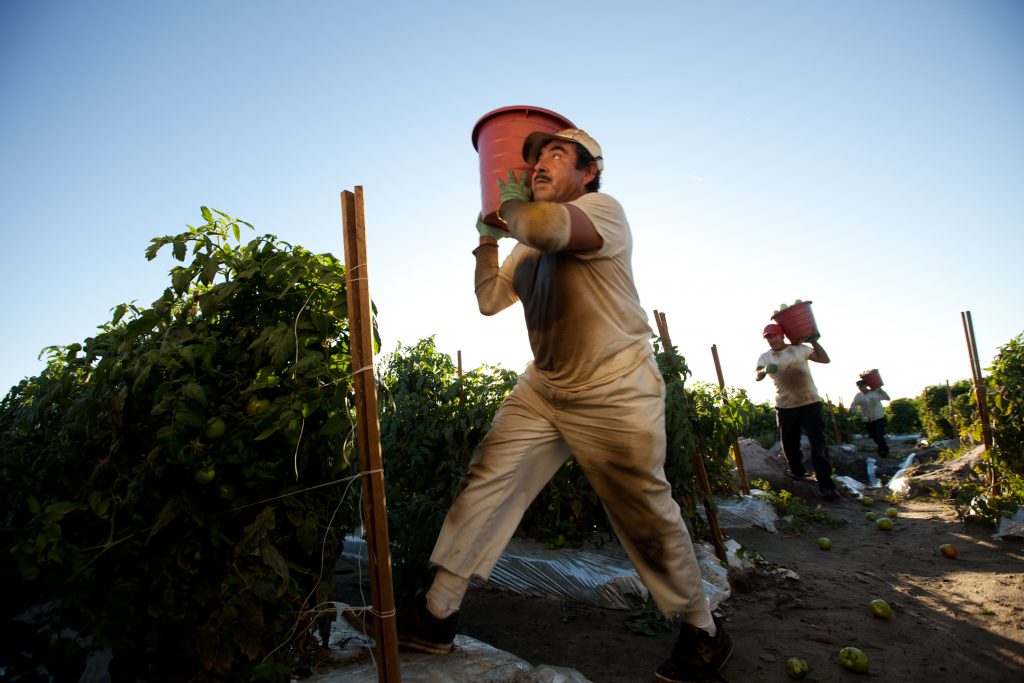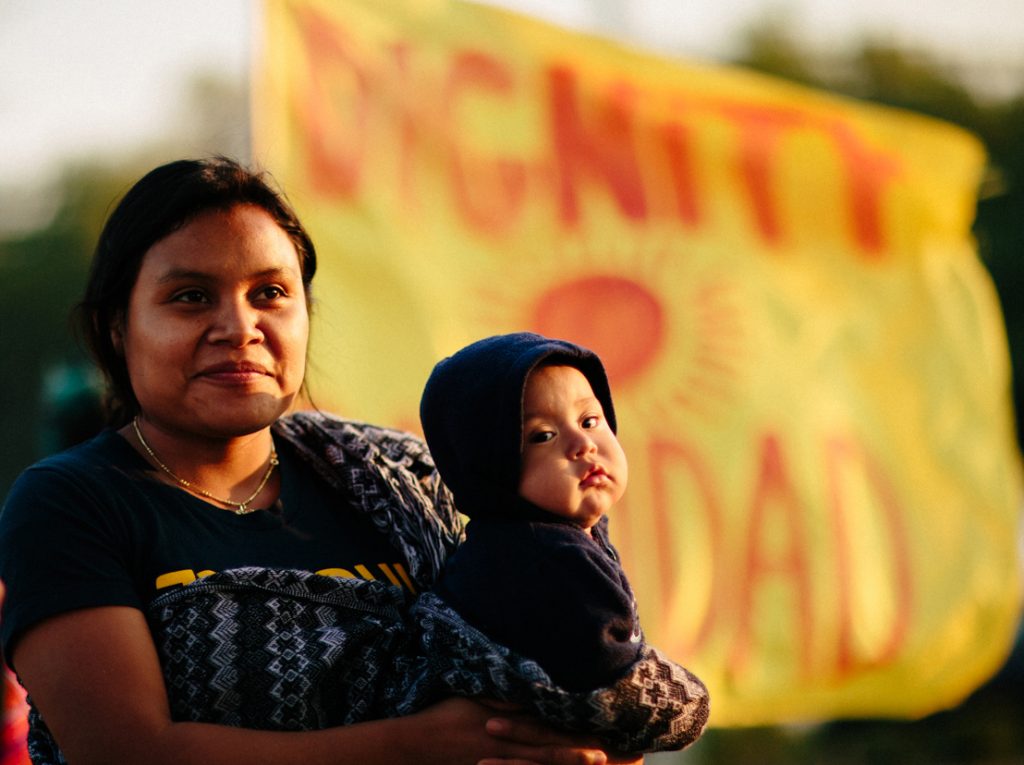ALUMNI SPOTLIGHT

BY SEAN SELLERS
In December, the Los Angeles Times published a searing exposé on the grinding poverty and rampant human rights abuses faced by workers in the Mexican tomato industry. Over the last decade, Mexican farm exports to the U.S. have tripled to nearly $8 billion dollars in response to the insatiable demand for cheap produce by supermarket and fast-food mega-brands. While value flows up the supply chain, the immense downward pressure on prices exerted by high-volume buyers has significantly worsened, if not altogether created, a human rights disaster for the tens of thousands of largely indigenous farmworkers who toil at the base of the industry.
The labor practices documented by the Times over the course of its eighteen-month investigation are horrific. Workers, many of whom are underage, are recruited and bused hundreds of miles from home, often living in squalid, overcrowded, and rat-infested camps. They are required to work six days a week for $8 to $12 dollars per day. In many cases, wages are withheld, false debts are incurred at the company store, and workers are prevented from leaving by violent camp supervisors, armed guards, and barbed wire fences. Many of the growers utilize state-of-the-art horticultural techniques and adhere to rigorous food safety standards to meet the exacting twenty-first-century demands of their corporate end-buyers in the U.S. As the Times aptly noted, “The contrast between the treatment of produce and of people is stark” (Marosi 2014).
Given the widespread violence and impunity gripping vast swaths of Mexico from Sinaloa to Ayotzinapa, the prospects for these workers in the short run are frighteningly bleak. Yet an experiment unfolding thousands of miles away in Florida could, under the right circumstances, offer a path forward for Mexico’s farmworkers in the years ahead.

For decades, the headlines streaming from Florida’s fields were not dissimilar from those in the Times’ recent Mexico series. Florida’s vast migrant farm labor system, which extends as far north as Maine in the summer months, was built from the ashes of the South’s collapsing sharecropping economy in the 1920s. With wages and bargaining power held down through legislative neglect and Jim Crow violence, this new class of workers quickly became among the most abused and powerless in the U.S., all while performing some of the most difficult and dangerous work this country has to offer. In 1960, Edward Murrow’s famous documentary, Harvest of Shame, quoted a grower who neatly summarized the situation: “We used to own our slaves. Now we just rent them.”
While the demographics of the East Coast farm workforce shifted in the last decades of the twentieth century from primarily African American to Mexican, Guatemalan, and Haitian immigrants, conditions remained abysmal. To work in the fields meant enduring, without recourse, a gauntlet of wage theft, sexual harassment, violence, and humiliation by one’s supervisor. Earnings, meanwhile, had begun to fall sharply in real terms in the late 1970s, prompting the U.S. Department of Labor in a 2000 letter to Congress to describe farmworkers as “a labor force in significant economic distress.”
In the extreme, farmworkers in Florida and elsewhere in the U.S. have faced situations of modern-day slavery, according to the high standard of proof required under federal law. In these instances, workers have been held against their will, with the threat or actual use of violence, and forced to work for little or no money. Several of these forced labor operations have been successfully prosecuted by the U.S. Department of Justice over the past fifteen years. In one example, two men were each sentenced to twelve years in federal prison after they “pleaded guilty to beating, threatening, restraining and locking workers in trucks to force them to work as agricultural laborers. . . . [They] were accused of paying the workers minimal wages and driving them into debt, while simultaneously threatening physical harm if the workers left their employment before their debts had been repaid” (CIW Anti-Slavery Campaign).

Today, this reality has dramatically changed, thanks to a worker-based human rights organization in southwest Florida called the Coalition of Immokalee Workers (CIW). Built on a foundation of farmworker community organizing starting in 1993, and reinforced with the creation of a national consumer network since 2000, CIW’s work has steadily grown over more than twenty years. In 2005, Yum Brands (parent of Taco Bell, Pizza Hut, and KFC) became the first corporate buyer to sign a Fair Food Agreement with CIW. This agreement established several crucial precedents for farm labor reform, including:
- The first-ever direct, ongoing payment by a food industry leader on behalf of farmworkers in its supply chain to address substandard wages;
- Market incentives for agricultural suppliers willing to respect their workers’ human rights, even when those rights are not guaranteed by law; and
- 100 percent transparency for tomato purchases in Florida.
Through its Campaign for Fair Food, CIW has since expanded and incorporated these principles, including a worker-drafted Code of Conduct with protections extending far beyond the legal baseline, into twelve subsequent agreements with corporate buyers from Walmart to McDonald’s. In 2010, with binding support from these multibillion-dollar retailers, the CIW’s Fair Food Program (FFP) went into effect in over 90 percent of Florida’s $650 million tomato industry, affecting some 30,000 workers a year.
The Fair Food Program brings workers together with growers, retail food companies, and consumers in a genuine partnership to improve wages and enforce dignified labor standards in agriculture, breaking the isolation of workers that has allowed abuses to go largely unchecked for generations. In four short years, the FFP has eliminated slavery, sexual assault, and violence against workers in Florida’s tomato industry. Less extreme abuses such as wage theft and health and safety violations have become the rare exception rather than the rule, and when they do occur, workers have access to a protected complaint investigation and resolution mechanism that is expeditious and effective. Additionally, Participating Buyers have paid over $17 million in price premiums to improve workers’ wages.
The FFP is intensively monitored by CIW and an independent third party created specifically for that purpose, the Fair Food Standards Council (FFSC). Through the Fair Food Program:
- CIW has educated over 25,000 workers face to face, and reached more than 100,000 workers with CIW-produced written and video materials, to ensure that workers understand their new rights and responsibilities;
- Workers have brought forth nearly 1,000 complaints under the Code of Conduct through FFSC’s 24-hour hotline, demonstrating workers’ trust that reported problems will be investigated and corrected; and
- FFSC has interviewed nearly 10,000 workers over the course of 125 comprehensive audits—ranging from two days to two weeks, including field, housing, management, and payroll components—in order to assess growers’ level of compliance.
The sea change brought about by the FFP in the once notorious Florida tomato industry has not gone unnoticed by academic, political, and business leaders alike. Susan Marquis, dean of the Pardee RAND Graduate School, told the New York Times last year, “When I first visited Immokalee, I heard appalling stories of abuse and modern slavery. . . . But now the tomato fields in Immokalee are probably the best working environment in American agriculture. In the past three years, they’ve gone from being the worst to the best” (Greenhouse 2014).

President Bill Clinton and Secretary of State Hillary Clinton honored the CIW with the 2014 Clinton Global Citizen Award “for defending the human rights of farmworkers across the United States.” From the stage, President Clinton called the FFP “the most astonishing thing politically happening in the world we’re living in today.” He later added, “You’ve got a success model, and you ought to put the pedal to the metal.” Just months later, at a White House ceremony, Secretary of State John Kerry presented CIW with the Presidential Medal for Extraordinary Efforts to Combat Human Trafficking for “pioneering the Fair Food Program, empowering agricultural workers, and leveraging market forces and consumer awareness to promote supply chain transparency and eradicate modern slavery on participating farms.”
Perhaps more remarkably, last year, Walmart, the world’s largest retailer, joined the Fair Food Program. Walmart became the first buyer to join the FFP not as a result of the Campaign for Fair Food, but rather because of the unprecedented success of the program itself. Walmart’s entry into the FFP set the stage for formal expansion beyond the Florida tomato industry. Beginning this summer, the FFP now covers the largest tomato farms in Georgia, North and South Carolina, the Delmarva Peninsula, and New Jersey. In fall 2015, the FFP will launch a pilot project in a second crop in Florida. And a recently launched Fair Food label is increasing awareness of the program at the consumer level. As Janice Fine, a labor expert at Rutgers University has noted, “This is the best workplace-monitoring program I’ve seen in the U.S. [The FFP] can certainly be a model for agriculture across the U.S. If anybody is going to lead the way and teach people how it’s done, it’s them” (Greenhouse 2014).

CIW has pioneered a new paradigm of worker-driven social responsibility—a form of human rights protection that is designed, monitored, and enforced by the very workers whose rights it is intended to protect—with implications far beyond U.S. fields. For example, the Bangladesh Accord on Fire and Building Safety—a groundbreaking, worker-enforced program to make garment factories in Bangladesh safe—grew out of years of effort by the Worker Rights Consortium (WRC) and allied groups. The Accord, under which more than 190 apparel brands and retailers have made binding commitments, draws on the WRC’s experience enforcing apparel industry labor codes and on the experience of the Fair Food Program, and it is already having a profound impact in Bangladesh in the wake of the 2013 Rana Plaza factory collapse.
As for the Mexican agricultural industry, progress will not be easy or quick. As long as the sociopolitical environment remains lethal for those struggling to secure a more dignified life, justice for the country’s farmworkers will likely remain unattainable. After all, as recently as the 1960s, racial terror permeated rural Florida and undermined the rule of law for those who most needed its protections, including the state’s farmworkers. It was only after this dark era came to a close that workers could begin the slow process of, brick by brick, transforming their industry. As a result of their efforts, the Florida tomato industry of 2015 is light years ahead of its 1960s predecessor. If the broader tide can be turned in Mexico, then the lessons and promise of the Fair Food Program will be waiting in the wings.
Sean Sellers is a co-founder and senior investigator at the Fair Food Standards Council in Sarasota, Florida. He received an MA from LLILAS in 2009. Three other LLILAS graduates currently work at the FFSC. For information on job opportunities, please contact info@fairfoodstandards.org. This article was originally published in the 2014–2015 edition of Portal.
References
Coalition of Immokalee Workers (CIW). Anti-Slavery Campaign. Available at http://ciw-online.org/slavery/.
Greenhouse, Steven. “In Florida Tomato Fields, a Penny Buys Progress.” New York Times, April 24, 2014. Available at http://www.nytimes.com/2014/04/25/business/in-florida-tomato-fields-a-penny-buys-progress.html?_r=0.
Marosi, Richard. “Product of Mexico.” Los Angeles Times, December–14, 2014. Available at http://graphics.latimes.com/product-of-mexico-camps/.


